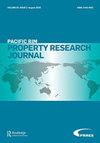Compensation for land use deprivation in mining: an analysis of the laws and practices relating to land use deprivation compensation in Ghana’s mining sector
IF 0.3
Q3 Economics, Econometrics and Finance
引用次数: 1
Abstract
ABSTRACT This article examines the laws and valuation methods that valuers apply in assessing compensation for land use deprivation in Ghana’s mining sector using two mining companies as case studies. We argue that analysing the valuation techniques applied in assessing compensation for land use deprivation in the context of current legal provisions facilitates a better understanding of the issues fuelling community dissatisfaction with compensation awards. Data produced through document analysis and interviews with 39 farmers, government officials, chiefs, private valuers, and officials of Newmont Goldcorp’s Ahafo Mine and Asanko Gold Ghana Limited were analysed in the context of the current legal framework for expropriation. Interview transcripts were coded based on themes and analysed using the constant comparison method. The findings reveal that the valuation techniques for assessing compensation for land use deprivation disregard fundamental compensation principles outlined under law. The study also exposes the weaknesses in the valuation techniques in assessing compensation for farmlands that mining may impair permanently. Towards ensuring fairness in compensating mining-impacted farmers, this study recommends additional legal directives to streamline the methods for assessing compensation for land use deprivation. The consequences of the limitations in the valuation methods on expropriated farmers are also discussed.采矿业剥夺土地使用补偿:对加纳采矿业有关剥夺土地使用补偿的法律和做法的分析
本文以两家矿业公司为案例研究,考察了评估师在评估加纳矿业部门土地使用剥夺补偿时应用的法律和估值方法。我们认为,在现行法律规定的背景下,分析用于评估剥夺土地使用补偿的估值技术,有助于更好地理解导致社区对补偿奖励不满的问题。通过对39名农民、政府官员、酋长、私人估价师以及Newmont Goldcorp的Ahafo矿山和Asanko Gold Ghana Limited的官员进行文件分析和访谈产生的数据,在当前征收法律框架的背景下进行了分析。访谈记录根据主题进行编码,并使用恒定比较方法进行分析。调查结果显示,评估剥夺土地使用补偿的估价技术忽视了法律规定的基本补偿原则。这项研究还暴露了评估采矿可能永久损害的农田补偿的估价技术的弱点。为了确保公平补偿受采矿影响的农民,本研究建议提供额外的法律指令,以简化评估剥夺土地使用补偿的方法。本文还讨论了估价方法的局限性给被征地农民带来的后果。
本文章由计算机程序翻译,如有差异,请以英文原文为准。
求助全文
约1分钟内获得全文
求助全文

 求助内容:
求助内容: 应助结果提醒方式:
应助结果提醒方式:


